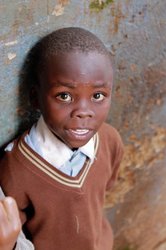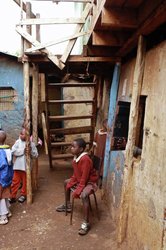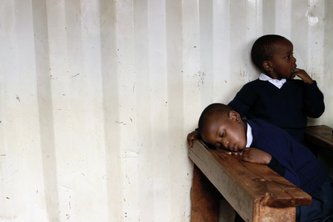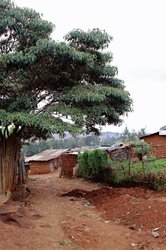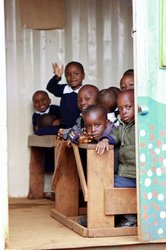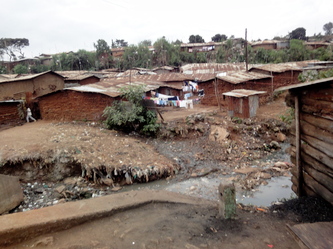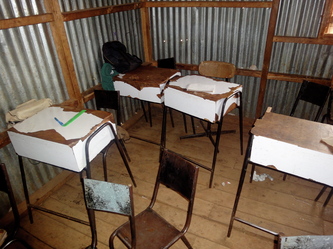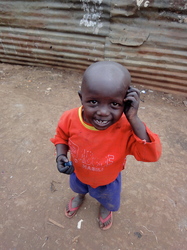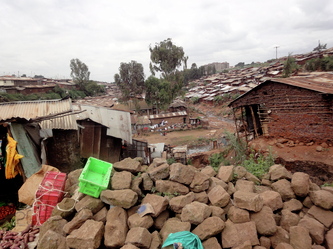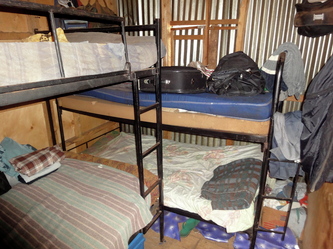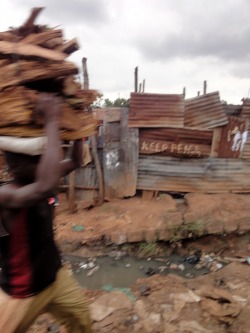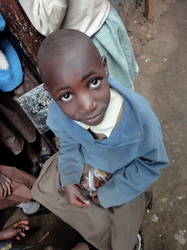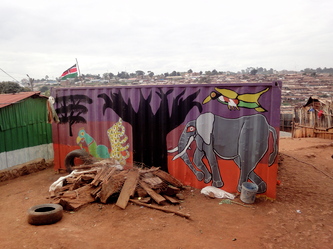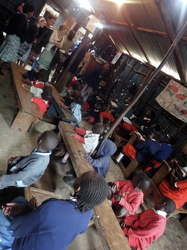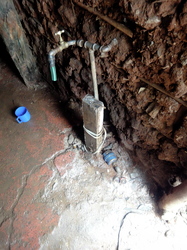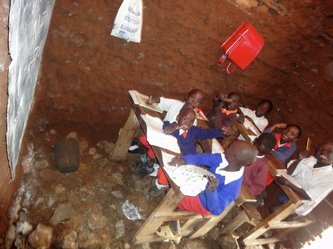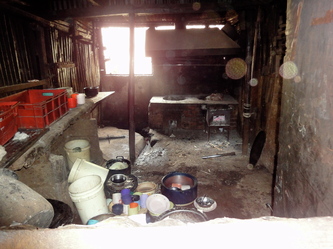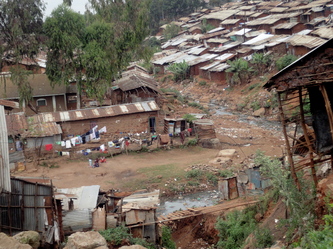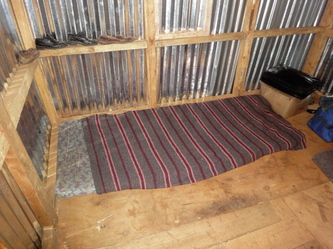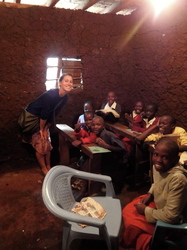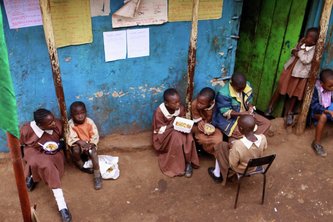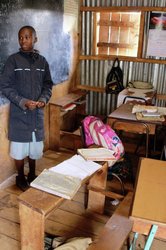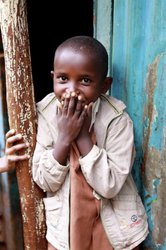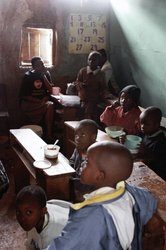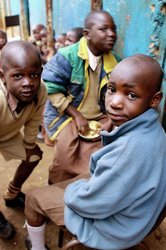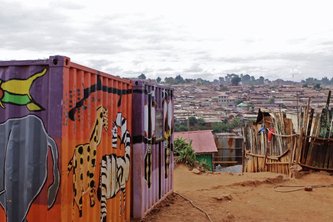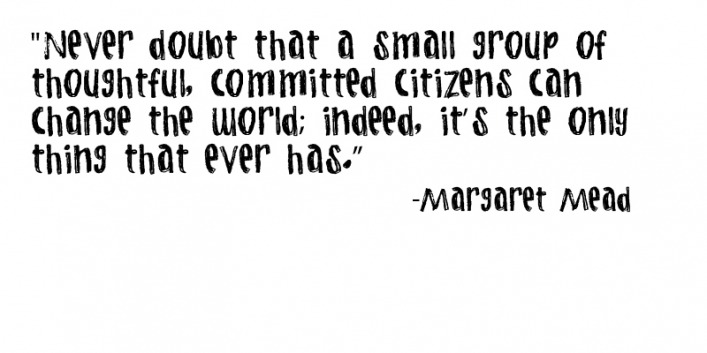Things you should know:
- Kibera is the second largest slum in Africa and is still growing.
- Approximately one million people live in Kibera.
- The majority of people do not have access to clean water, electricity, sewage disposal, or toilet facilities.
- The government doesn't provide any schools or medical facilities inside Kibera.
- Approximately one million people live in Kibera.
- The majority of people do not have access to clean water, electricity, sewage disposal, or toilet facilities.
- The government doesn't provide any schools or medical facilities inside Kibera.
My visit to Kibera:
A lady named Beatrice Njoroge showed us around the slums - she is the director of a program in Nairobi that networks children’s schools and homes, so she knew places we could visit in Kibera. She said many people have big hearts, so they start an organization, but they don’t have the means to keep it running. Therefore, they hold trainings and conferences throughout the year to help these people. The name of the organization is SIM Kenya (Serving in Mission). This is actually a global organization as well (SIM).
The first school we visited was very difficult for me – I had to hold back tears multiple times. The headmaster gave us a tour of the place. It was both a school and orphanage and it educates 300+ children. The orphanage part was very overwhelming for me to see… they had around 14 beds bunked in a room barely bigger than mine at home and they slept 4 or 5 kids to a twin size bed. All of the beds were side by side with few blankets and the room was very dark. I cannot even imagine sleeping in conditions like that. The classrooms were VERY small as well, especially when you consider how many students they have. The headmaster told us he faces three main challenges:
1. Food. Since they aren’t funded, they oftentimes run out of food to feed the kids. They usually have only one meal per day. When this happens, the kids are unable to focus in school and they begin to think about their homes, families or horrors they have witnessed. For instance, most of the kids are total orphans (have lost both of their parents) and during the political/election conflict, many of the children’s parents were murdered right in front of them.
2. Medicine. The headmaster told us he wishes they had access to basic medicine to cure colds, headaches, or stomachaches. When the kids are feeling ill, is all they can do is pray for them and tell them to go rest. This was hard for me to deal with because at home we have such easy access to things such as Tylenol, Advil, or Tums.
3. Keeping the staff. They don’t have money to pay the teachers, so they have a very difficult time keeping staff. The teachers will often get stressed and quit because they can’t care for their family, pay their rent, or they leave because they can work somewhere else for a salary. They used to have about 15 teachers, and only two of the same ones are still there. The head teacher left last year.
This orphanage and school was very needy – the headmaster told us if we even came across a pencil, they would love to have it. Despite all of the hardships he faces, he still was praising God for what He had blessed them with. This amazed me. I saw so much of this in Kenya – people praising God and thanking Him, even when they have so little. The people there choose to have joy from God no matter what. The people truly depend on and trust in God.
The second school we visited was very different and overwhelming in new ways. The classrooms were even smaller than the previous schools, and the building was very dark. Upstairs, where the orphans slept, was devastating. They sleep on a little mat on the ground with one blanket in an empty room.
The last school we visited was the nicest of the three. The classrooms were painted on the outside as it is a form of therapy for the children. The classrooms were also much more spacious and we were able to visit a class that was preparing for the exams to get into high school. The students stood up and sang a song to us about Jesus - how they have a Father who will never ever fail them. The faith the people of Kenya have, despite their hardships, continues to amaze me.
Why I want your help:
I'm asking for your help because I believe "the gospel means much more than the personal salvation of individuals. It means a social revolution." I think it is more than just believing in something - it is a way of living. My life is forever transformed after my experience in Kibera. I can't forget the beautiful faces of the children, the stench of the garbage, or the other images of extreme poverty that I saw. Every day I am reminded as different memories flow through my mind. As I'm eating dinner, I remember the children who may not get a meal that day. As I'm drinking clean water, I think of the thousands who don't have access to any clean water. As I get ready to go back to school, I remember the schools who asked for even just one pencil since they were so desperate for supplies. I know I can't continue to live comfortably while so many others need so much. I believe we have the potential to change the lives of so many children and I am hoping you will grasp that opportunity with me. I left a part of my heart in Kenya. A quote from Mother Teresa has challenged and inspired me to "see Jesus in disguise" in each and every child and person I met there. I find joy in loving God by loving His people. The joy, love, and peace I felt in Kenya I have never felt elsewhere. I want to love my neighbor as myself - they may be on another continent, but in my mind, they are still my neighbor. I am praying you will join me on the journey to transform the lives of so many in Kibera. I pray you will have a giving heart and be able to experience the true joy of helping and loving others.
1. Sponsor a child. This will pay for a child who otherwise wouldn't be able to get an education.
2. Become a pen pal with a student at a school. By doing so, you will be changing the life of a child - they will feel someone out there truly cares for and loves them. Have your life forever changed as your eyes are opened to another world in Kenya.
3. Donate money for school supplies, food, medicine or clothes. Get a report back including photos on how your funds were used!
4. Donate money for a temporary abused rescue emergency home for children. Beatrice needs to raise $7,200.00 for the first year rent of the home.
5. Donate school supplies, children's medicine, clothes, or blankets. I will bring all of these supplies with me when I go to Kenya next summer.
If you are interested in helping out and want more details - contact me at [email protected].
